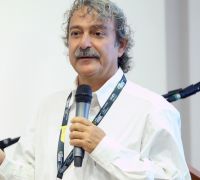Mini Symposium 2022 Dec 7 - Yiannis Laouris
|
Dialogic Design Science: A powerful sense-making and action-taking tool
Abstract
Yiannis Laouris, presented Dialogic Design Science: A powerful sense-making and action-taking tool in the Mini Symposia series. The exponentially increasing rate of change in all processes around us, combined with the rapidly growing complexity of sociotechnical problems, makes the need for the effective management of large-scale systems an acute emergency. We argue that, in the foreseeable future, neither crowdsourcing (i.e., distributed, parallel processing) or direct democracy nor research that aims to help us humans manage or significantly increase our biological intellectual capacity will allow any single human to tackle alone the complex challenges faced today. Furthermore, we lack sufficient scientifically or empirically validated tools or methodologies to assist large groups of individuals in utilizing their collective intelligence and wisdom. To make sense of and manage the complexity of our world, we rely enormously on computers. Computers can collect, analyze and present data in forms that help us make sense of the world. However, as the singularity is approaching, we ought to accentuate the difference between intelligence and wisdom, between a solution that is optimal and a solution that serves us to sustain whatever makes us humans. In this presentation, the author will exemplify why and how the science of dialogic design and its co-laboratories of democracy process can be utilized to engage diverse stakeholders (i.e., people from all walks of life) in authentic, highly democratic dialogues. The most outstanding contribution of this branch of systems science is that the transition from the cognitive part (making sense and envisioning solutions) to taking action happens automatically. Participants are always willing to assume some kind of responsibility and take action.
Short Bio
Laouris was born in Paphos, Cyprus, in 1958. He attended The English School, the Pancyprian Gymnasium, and the Acropolis Gymnasium. He served in the Cypriot National Guard as the first Cypriot senior cryptographer after the 1974 Cypriot coup d'état and the 1974 Turkish invasion of Cyprus. He graduated from the medical school of the Karl Marx University (today known as University of Leipzig), enjoying three parallel scholarships because of his top grades, and completed a PhD in Neurophysiology with summa cum laude with Prof. Peter Schwartze at the Carl Ludwig Institute of Physiology. Laouris and his wife Joulietta were the first students to be awarded a PhD before graduating from university, an achievement that received press coverage.[1] He continued his research in neurophysiology at the Georg-August University Göttingen with cyberneticists and systems physiologists Professors Hans Diedrich Henatsch and Uwe Windhorst. He subsequently joined the Robotics, Prosthetics, Motor Control Group at the University of Arizona, where he collaborated with Douglas G. Stuart. In the U.S., he also completed a Masters in Systems and Industrial Engineering.

